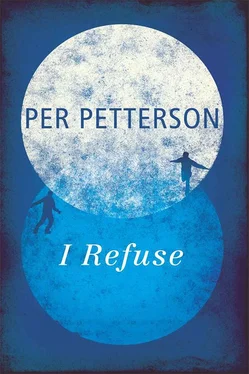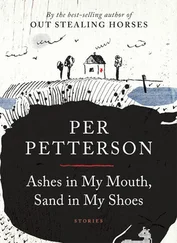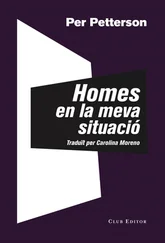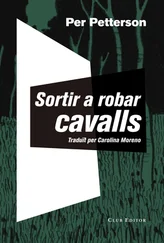Jim didn’t know who he was supposed to miss, or if it was possible to miss someone he didn’t know, that he had never seen, who left no trace, no hollow in his life, no vacuum for him to fill, he didn’t know if the feeling he had when he thought about all this was the feeling of loss , but it was clear enough that Tommy had something Jim didn’t have. Tommy’s father was as visible as you could wish, and the women could see him every single day running up and down the road with the dustbins on his shoulder, and the men took part in his rough games, but then Tommy was given his beatings, and surely there was nothing there to mourn. No one had ever beaten Jim, not yet, and his mother didn’t beat him, she didn’t believe in beatings, she didn’t want to chastise her own son.
He got out of bed and went to the kitchen, and there he saw the clock above the door, bulging, quivering like a jellyfish, oh, Christ, I’m in a tight spot now, he said aloud and spun round in the doorway and ran into the bathroom instead, into the shower cabinet, and stood there for three minutes to the second with the ice cold water hammering against his head. He looked at the clock again, a different clock, and from behind the steam it had moved on a good deal further than the one in the kitchen and ended up like Dali’s melting clock on the wall above the mirror where every morning he watched himself keep life going against all the odds with the electric shaver raised to his face on the days he didn’t go to the bridge. There wasn’t any alcohol in his blood now and it probably wasn’t that much this morning either, he didn’t think he would have been stopped and lost his licence in the Enebakk forest or on his way down to Hauketo. And he ran into the hall and pulled on his worn-out reefer jacket and quickly pushed the buttons through the holes and undid them equally fast and said, for God’s sake, the whole jacket stinks of fish, why is it hanging here next to the Sunday best clothes in the first place, he said, what was I thinking, he said and took a different jacket, a coat, in fact, grey, anonymous, stain-free, which he had worn only twice. Then he hurried to the stairs going down to the garage two floors below and got in his car and drove out into the light and down the first long hill and then the next hills towards one of the three rivers, towards Lillestrøm. It was already late in the day.
He parked by the railway station, by the tracks on the south side, it cost twenty-five kroner there, for twenty-four hours, you didn’t find it any cheaper, and then he walked along the rails and around the brick building with the fitness centre inside, called SATS. You could see the exercise bikes through the windows and the sweating bodies in their tight training suits, and he went on into the station building past the Narvesen kiosk and past the stairs up to the platforms, from number 8 right through to number 1, and then past the Narvesen kiosk at the other end and out through the doors on the side of the station facing Lillestrøm city centre.
He turned left on the bend by the art centre and into the high street. It was chilly along the road, but it was always colder in Lillestrøm and windier than anywhere else in Romerike, and the wind was moist and clingy and stuck to your skin.
From the high street he entered the mall, Lillestrøm City, through the swing doors, and right after the doors, before the shops unfolded to the left and right, he stopped in front of the door leading to the staircase and the lift and stood there waiting. There was a sign on the wall that among other things said: Social Security 2nd floor. I’ll have to go up there he thought, I have no choice. But he didn’t open the door. He looked at his watch. There was still another quarter of an hour. He walked into the mall and took the escalator down to the basement where the bakery was open, and from the lady behind the counter he bought a pastry, which he ate standing up, and when he looked at his watch, there were only five minutes to go. He took the escalator up to the ground floor and walked over to the lift, pressed the button and the lift was already there and on the second floor he got out and spotted the correct door at once, he had been here several times before, and he didn’t knock, he just walked straight in.
IT WAS PAST midnight. It had been Thursday, now it was Friday. They had turned off from the main road and on to the gravel road by the crossing, where the milk ramps had stood since the dawn of time, and were walking home after a party at Willy’s. Willy had moved from the neighbourhood and now lived closer to Mørk, in a detached house on a piece of flat land that was nothing more than that, not a field, not a meadow, it was strange that no one had put a plough to it.
Willy had two parents. When they were small Jim and Tommy had thought it was a creative idea to have two, at least for some time they did, until they realised it was what most people had, on a permanent basis. Jim still had his one, and Tommy had none. He had Jonsen, but Jonsen was also just one, it was he who kept Tommy on the leash. Not that it was much of a job. Now they were walking in the night and were a little drunk. Not very drunk, just drunk. As they walked, the drunkenness wore slowly off, evaporated and dissolved and drifted in between the trees like damp rags, and then it was easier to walk in a straight line, and it was May and not difficult to see the road in front of them, but you couldn’t say that it was light. If you were outdoors at night, standing by the corner of a house waiting for someone to come through the forest, someone you knew well, someone you had loved for years, it was hard to catch sight of her until she was quite close. But now there wasn’t far to go, a kilometre only, maybe less, and they would pass Sletten’s house, which was the first in the row as you came into the neighbourhood. You could make out the light from his outside lamp, and then there was a bend, and the light disappeared, and then the light returned.
At Willy’s there was beer and bickering about which records to play, and a couple of the boys who came down from Valmo had spirits with them in shiny hip flasks their fathers had given them in the hall on their way to the front door, or more likely, on the steps so their mothers wouldn’t see, and that was a pretty normal thing at least for Valmo. Just cut loose, the fathers said, that’s what youth is for, but for Christ’s sake don’t bring the knives with you. They would never have brought the knives with them, that time was over, hell, if there were knives, there would be old-time dancing and tango too, but there was trouble anyway, and a vase was smashed, a very pretty old vase decorated with Chinese symbols that was a favourite of Willy’s mother, and Willy, who was drunk, burst into tears. I will never be like you, he cried, I will never be like you, and that was true, of course, but Jim said it didn’t matter, Willy, he said, it doesn’t matter, it’s nothing to strive for, Jim said. And then a couple of the boys were spoiling for a fight, and Tommy stepped between them and almost lifted them apart, and anyway it wasn’t a real party if there were no girls. Why were there no girls there, why wasn’t Unni from the Co-op there, she always came, and Tommy was moving her way, everyone knew that, and why wasn’t Tone from school there, and why wasn’t Reidun there, what the hell had Willy been thinking. And it turned midnight, and Jim and Tommy looked at each other and put down whatever they were holding and left.
Outside on the steps, they stopped for a minute in the wonderful air, it was night, it was early May, and Christ, how wonderful the air was, it hadn’t rained for a week. Jim tried to roll a cigarette, but he couldn’t do it. Shreds of tobacco dropped from his fingers and the paper fluttered in the yellow light from the lamp above the door.
Читать дальше












